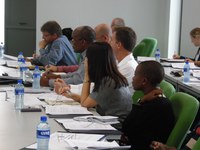Urban and regional planning course unpacks SPLUMA
This Act is likely to come into effect in mid to late 2015. The Act introduces far-reaching changes to the legal and institutional framework for urban and regional planning in South Africa.
A key feature of the new system introduced by SPLUMA is a re-alignment of the decision-making mandates of local and provincial government. It is also a framework Act, so it will have to operate in tandem with provincial planning laws and/or municipal planning by-laws. SPLUMA also introduces a new role for national government in both spatial planning and land use decision-making. These represent fundamental changes in the way that the planning system works. The course intends to dispel some of the confusion that exists behind the reasons for SPLUMA containing the provisions that it does, and to support participants as they seek to carry out their current functions in the context of the new legislation.
The course located the advent of SPLUMA within the context of planning law reform in South Africa, since 1910, and will provide both theoretical and practical guidance on the key features of the planning system that will change as a result of SPLUMA. It is designed to benefit professionals who are working on spatial planning and land use management in South Africa. This includes planners and lawyers in municipal, provincial and national government as well as in private practice as well as developers, architects and property analysts.
The intensive course took place over two days at the University of Cape Town, and consists of lectures and interactive work within the group. It is assumed that the participants will have practical experience of the field that they will contribute to the enrichment of group discussions. A voluntary written assessment was given to the group before the course, for completion after the course.

